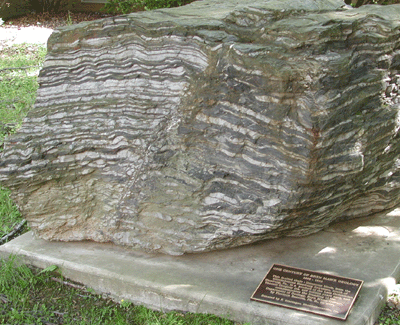The big bang. Plate tectonics. Tsunamis. Evolution. Caterpillers. Butterflies. Rainbows. Ovid's Metamorphosis and Butler's Parables. Human Development. Technology. K-16 Collaboration. From the beginnings of the universe to the development of new computer technologies, change is necessary for life.
Energy is neither created nor destroyed, but takes different forms: as in the scattering of white light into the colorful spectrum of the rainbow. As inorganic matter changes into organic life and then continues to evolve over time. As a caterpillar changes into a butterfly, and human culture designs new technologies at an ever-increasing pace.
What do such changes mean for us as changing creatures? How do we cope with them? In search of understanding, we create stories to supply meaning, consistency and consensus. What stories does science tell in this regard? How helpful are they in answering these questions?
Science is often thought of as a special set of interests, abilities and practices, rather than as a process of question-asking, intuition-testing and story-revising that all of us engage in daily, and which all of us--whatever our content area--can pursue in our classrooms. Understood in this way, science is accessible to everyone, and best taught in relation to other parts of the curriculum, by teachers who are themselves excited by the sort of teaching and learning that involves exploring new realms and
trying out new tasks.
This Institute will provide selected K-12 teachers with an opportunity to explore ways of better "understanding change" in the universe as a whole and in human beings in particular. The Institute is an intensive workshop aimed at developing inquiry-based, hands-on classroom "modules" which allow students themselves to develop scientific understandings of change, with teachers acting as their guides and consultants. A series of demonstrations and experiments, developed by College faculty in physics, geology, biology, literature, psychology and computer science, will be presented each morning; teachers will be asked to assist, each afternoon, in conceiving ways to adapt the modules to their own classroom settings. Attention will also be given to the internet as a valuable tool for both curriculum development and dissemination of information.
The Institute Directors are Anne Dalke, Senior Lecturer in English and Co-ordinator of the Feminist and Gender Studies Program at Bryn Mawr, and Wilfred Franklin, Laboratory Instructor and Coordinator in Biology. Professor Dalke's primary area of scholarly questioning, just now, concerns the intersection of science and literature, and what it means for interdisciplinary teaching. She has published two collections of essays, Teaching to Learn/Learning to Teach: Meditations on the Classroom and Minding the Light: Essays in Friendly Pedagogy. Professor Franklin teaches the major and non-major biology laboratories and is currently collaborating with faculty in many sub-disciplines to develop a new Inquiry-based curriculum for the Biology Department at Bryn Mawr.
The Institute directors will be assisted by Paul Grobstein, Professor of Biology and organizer of the Summer Institute program, and by colleagues in a number of other College science
departments.
[Tentative Working Schedule
Mon,7/25 Liz McCormack: The Beginnings of the Universe
Tues,7/26 Don Barber or Arlo Weil: Plate Tetonics and Tsunamis
Wed, 7/27 Sharon Burgmayer: Rainbows
Thurs,7/28 Paul Grobstein: Evolution
Fri, 7/29 Mini-Symposium on K-16 Collaborations
Mon, 8/1 Anne Dalke: Metamorphosis in Literature
Tues, 8/2 Wil Franklin: Caterpillers and Butterflies Make Choices
Wed, 8/3 Kim Cassidy or Rob Wozniack: Human Development
Thurs, 8/4 Deepak Kumar, Doug Blank or Ted Wong: Technology and Change
Fri, 8/5 Presentation of Final Projects]
Institute Requirements and Follow-up: Fellows will be expected to play an active role in the Institute, helping to develop effective ways to integrate scientific concepts and perspectives with other aspects of the curriculum. In addition to active participation in discussion during the two week summer session, Fellows will be expected to prepare a written proposal describing plans to make use of Institute experiences in their own classrooms, to experiment with these during the following academic year, to participate in several follow-up meetings during the year, and to prepare a report of their year's activities which can be posted on a World Wide Web site so as to be available to other interested teachers.
Institute Schedules and Location: This Institute will take place at Bryn Mawr College from July 28 through August 5. Sessions will be held from 9 a.m. to 4 p.m. on Mondays through Fridays. Lunch will be provided.
Eligibility: High school, middle school and elementary school teachers, including department heads and school administrators are eligible. Participants may teach science and/or other subject areas. Preference will be given to teams of teachers from schools that serve overlapping student populations. Please indicate team memberships on the applications forms. Enrollment will be limited to eighteen.
Incentives: Participants from Philadelphia schools will receive 60 hours of Act 48 credit, and a $500 stipend. An additional $300 per participant to purchase educational supplies and materials will be available to Philadelphia teachers submitting cogent curriculum proposals and agreeing to provide a written report on their experiences.
Principal's Commitment: Institute participation requires signature of principal.
Application procedures: Information and application forms are available on line at http://serendipstudio.org/local/suminst/application.html. See http://serendipstudio.org/local/suminst/ for information about the general program and other available Institutes.
For more information: Anne Dalke, Department of English, Bryn Mawr College, Bryn Mawr, Pa. 19010, 610 526-5308, adalke@brynmawr.edu or Wil Franklin, Department of Biology, Bryn Mawr college, Bryn Mawr PA 19010, 610 526-5090, wfrankli@brynmawr.edu.
